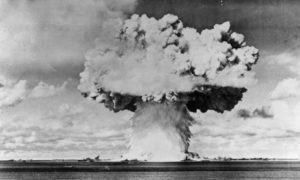
An atomic bomb test explosion off Bikini Atoll ©Keystone/Getty Images
On 5 October, the International Court of Justice (ICJ) upheld the objection to jurisdiction raised by India, Pakistan and the United Kingdom (UK) in the case opposing them to the Marshall Islands. As a consequence, the Court cannot proceed to the merits of the case.
The Marshall Islands had filed an Application against the three states alleging a failure to fulfill obligations concerning negotiations relating to the cessation of the nuclear arms race and to nuclear disarmament.
In the first phase of the proceedings on admissibility, the United Kingdom, India and Pakistan raised several objections to the jurisdiction of the Court and the admissibility of the application.
The Court, consisting of 16 judges, ruled that there was no evidence that the Marshall Islands had a prior dispute with any of the three nuclear powers or had sought negotiations on the issue. The existence of a dispute between the parties is a condition of the Court’s jurisdiction.
The Court noted that, although the filing of the Application and the Parties’ positions during the proceedings show the existence of a dispute, this cannot create a dispute de novo, one that does not already exist.
The 16 judges of the Court were divided on the ruling. With the exception of Judge Greenwood (UK) and Judge Gevorgian (Russia), all of the judges appended a declaration, separate or dissenting opinion to the Judgment of the Court.
The Marshall Islands were the subject of a string of devastating nuclear tests between 1946-1958, carried out by the United States as the cold war arms race gathered pace. The Marshall Islands had initially sought to use the case to force nuclear powers to disarm, by filing cases against nine states: the United Kingdom, the United States, Russia, France, China, India, Pakistan, Israel and North Korea. However, given the fact that only the UK, India and Pakistan recognise the jurisdiction of the International Court of Justice, only those three cases proceeded to the preliminary stage.
After the hearings the Marshalls government said it would “study the ruling”, which is final and without avenue of appeal.
